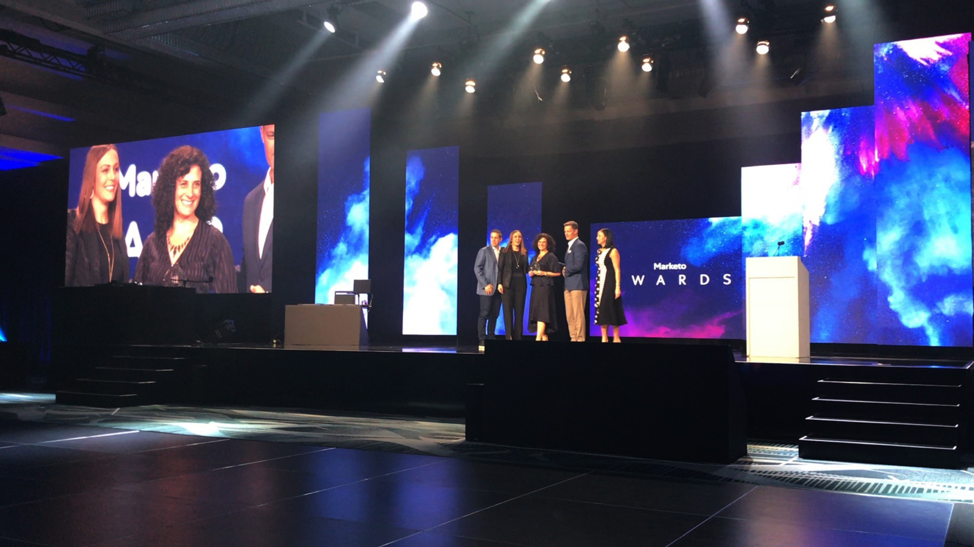
After a decade in the world of B2B MarTech partnerships, I had one of my proudest moments this January at Marketo’s RKOM: standing on stage to accept the Marketo Services Partner of the Year award on behalf of the entire DemandGen team.

Many of my Alliances peers reached out with words of congratulations and one burning question: “How did you do it?” In an ecosystem crowded with talented boutique agencies and global systems integrators, why did DemandGen rise to the top?
Here’s my take on why we received this honor, presented in the form of 5 pieces of advice for standing out as a partner with Adobe/Marketo (or with other companies in our ecosystem):
Tip 1: Understand What Success Looks Like for Your Partner
One of the foundational elements of a healthy partnership is driving value for both parties. Digging into key performance indicators (KPIs) for your partner is particularly important when engaging with a large company with a mature partner program such as Marketo or Adobe. There are two elements to this conversation: (1) What metrics does the company use to stack-rank its partners and (2) How does your partner manager get paid?
Typically, these two elements are aligned — with the partner manager’s variable compensation driven by KPIs that tie into the organization’s broader focus on measuring partner performance. With Marketo (and now, Adobe), the primary indicator of our value as a partner is co-sell revenue — the number and value of Marketo deals created or influenced by DemandGen. Our Marketo partner manager also has a co-sell quota, and performance against plan dictates how much he gets paid.
In addition to co-sell revenue Marketo looks at some secondary criteria, including the number of certified consultants on our staff, as well as softer metrics like our level of responsiveness and willingness to say yes to asks from their team. This brings us to Tip 2…
Tip 2: Show Up, Lean In, and Find a Way to Say Yes
Co-sell revenue and number of certified consultants are quantifiable metrics that helped DemandGen win, but a host of important (but less tangible) behaviors also played a key role. During my career, I’ve been on both sides of the partner equation — managing Eloqua technology partners at Oracle and working with the big marketing automation (MA) vendors as both a technology partner (ReadyTalk) and as a services partner (DemandGen).
Succeeding with Marketo, Adobe, or any other partner that’s strategic to your business takes more than signing up for a program. It requires time, energy, resources — and an ongoing commitment to all three. It also takes someone with a positive attitude who is easy to work with. If possible, invest in a full-time Alliances resource to build and nurture the relationship over time. Show up and lean into the partnership. Get to know your partner manager, agree on what success looks like, and talk regularly to move deals and the relationship forward.
Whenever possible, say yes to asks from your partner. For example, the Marketo LaunchPoint® team asked DemandGen to create a sample MarTech stack to support the launch of their stack building tool, and we invested the time to tailor one. By being responsive and consistent with seemingly small asks, you are poised to become a go-to person for your partner manager.
Tip 3: Give Before You Get and Always Bring Value
I have seen first-hand that there are companies in the MarTech space with unrealistic expectations about partnerships. They mistakenly think that if they sign up to be, say, a Marketo Services Partner or an Oracle AppCloud partner, deals will magically appear on their doorstep. It doesn’t work that way. In this world, you have to give before you get and constantly focus on bringing value.
Approach your strategic partner from the perspective of, “How can we help?” On the co-selling front, be proactive with account mapping and do the heavy lifting of identifying companies where you can help open doors or advance deals for the partner’s sales team. Create a list of mutual customers and align with your partner to uncover expansion opportunities for both organizations.
Constantly listen for places you can bring value. For instance, we noticed last year that many of the Marketo Account Executives were experienced enterprise sellers, but they were new to MarTech. So, we created an enablement asset that provided tips on discovery questions to use when selling to marketers.
Tip 4: Underpromise and Overdeliver
Saying yes is an important part of being a good partner. But when you do, be prepared to do the work required to live up to your commitments. Follow up on next steps from account alignment conversations. Deliver your guest blog post on time. Show up and be prepared for your recurring calls. Make your partner manager look good.
Being responsive and keeping your word is crucial to standing out in a crowded ecosystem and becoming a go-to resource for your partner.
Tip 5: Continuously Invest in Expertise
As hinted at in Tip 1, another hard metric that partners like Adobe and Marketo look at is the number of certified services resources that an agency like DemandGen has on staff. Certifications may not seem important if you hire the right people, but they definitely play a role in assessing partner performance.
In 2018, DemandGen invested in getting more than a dozen additional team members certified on Marketo. In addition to investing in core platform certifications such as the Marketo Certified Expert (MCE) and Marketo Certified Solutions Architect (MCSA), we also said yes to getting members of our team enabled on add-on solutions like Bizible and Marketo Sales Engage (MSE). And the Adobe acquisition adds a whole new set of products where we can extend our B2B marketing expertise.
Want to be a good agency partner? Encourage your team to prepare for and take certification exams. Be on the lookout for opportunities to expand your practice to other products in the partner’s portfolio. Carve out time and budget to support this type of employee development. Investing in education and certifications not only demonstrates a commitment to the partnership, it also ensures your team is well-positioned to help clients make the most of the platform and provides career development opportunities for your staff. It’s a win all around.
If you are a seasoned Alliances professional, I hope that these tips help you take your strategic partnerships to the next level. If you are just getting started, check out my previous post, The Fundamentals of Alliances: 5 Steps for Building an Effective Partner Program. Good luck!
Partnering with major players like Adobe/Marketo or Oracle? Managing partners at one of these organizations? Please chime in with your own “dos” and “don’ts” for creating successful, mutually beneficial partnerships.

A presence in the world of B2B MarTech alliances for the past decade, Anita Covelli is the VP of Alliances at DemandGen. She is responsible for building and driving value from relationships with strategic partners like Adobe as well as MarTech ISVs who are members of the DemandGen Alliance. Before joining DemandGen in 2017, Anita helped scale and grow the AppCloud technology partner program at Oracle Marketing Cloud and built a successful partner program from the ground up at webinar and conferencing provider ReadyTalk.
The post How DemandGen Became Marketo Services Partner of the Year: 5 Tips for Being an Award-Winning Partner appeared first on DemandGen.























